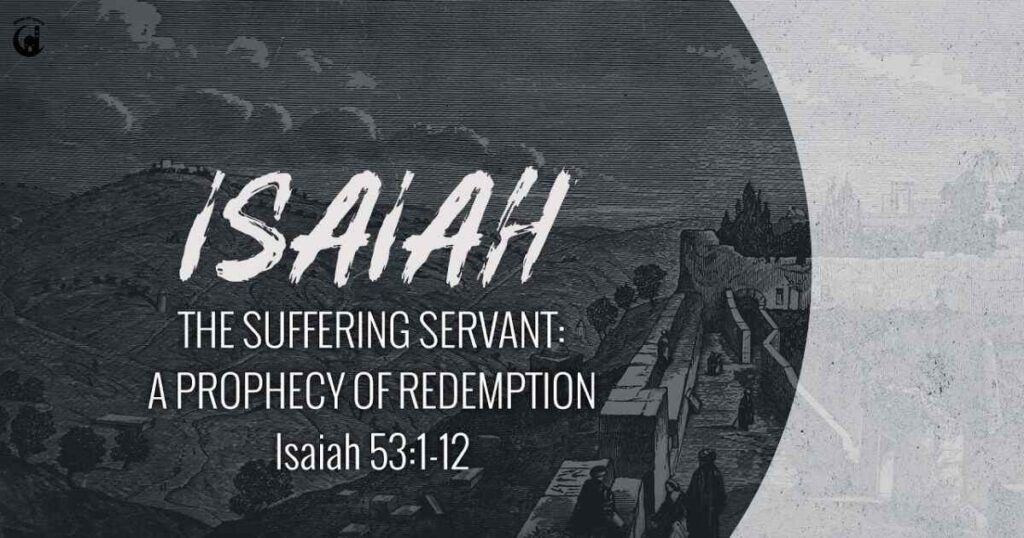Seven centuries before Jesus walked the earth, Isaiah penned words that would shake humanity forever. The Suffering Servant prophecy stands as one of scripture’s most compelling passages. It is raw, uncomfortable, and absolutely beautiful. Isaiah 53:1-6 does not sugarcoat reality; it presents a servant who suffers tremendously yet accomplishes something magnificent. Many people stumble over this passage because it contradicts our expectations of power and glory.
We expect heroes who dominate, not servants who suffer. Yet this messianic prophecy reveals God’s upside-down kingdom where strength emerges through weakness. Understanding Isaiah 53:1-6 meaning transforms how we see sacrifice, love, and redemption. This passage isn’t just ancient poetry it is a roadmap to understanding Jesus Christ and why his mission required such profound suffering. Let’s unpack these six verses and discover why they matter desperately for your life today.
The Servant’s Appearance (53:2)

Isaiah uses agricultural imagery that would resonate with ancient readers. The servant grows “like a young plant” before God. This doesn’t describe a mighty cedar or stately oak; it is a tender shoot, vulnerable and easily overlooked.
Yet notice something beautiful: he grows “before the Lord.” God watches this servant with intimate attention. The Father observes every stage of the servant’s development with care.
This imagery points directly to Jesus Christ‘s humble birth. Born in a stable, raised in obscurity, no earthly power or political connections. Just a carpenter’s son from an insignificant town.
These contemptible beginnings made people stumble. How could the Messiah emerge from such ordinary circumstances?
Isaiah calls the servant “a root out of dry ground.” This echoes earlier messianic passages (Isaiah 11:1,10) where Christ emerges from Jesse’s line like a branch from a stump.
The dry ground represents Israel’s spiritual wilderness. Throughout Isaiah, dry land symbolizes spiritual desolation (Isaiah 32:15; 35:1,6; 40:3). The nation had wandered far from God despite their religious rituals.
The Servant’s Reception (53:3)
The servant did not receive polite disagreement. People found him contemptible, despicable, and revolting. The phrase “forsaken and rejected” carries weight in Hebrew; it is comprehensive abandonment.
This “man of sorrows” knew grief intimately. Not because he walked around depressed, but because suffering, pain, and sickness touched his life personally. He wasn’t immune to human frailty.
Jesus Christ experienced this rejection fully. Religious leaders plotted his death. Crowds who welcomed him Sunday screamed for his crucifixion Friday. Friends abandoned him when danger arrived.
The imagery intensifies. People treated the servant like someone with a contagious disease, refusing even to look at him.
Worse still, they considered him worthless. “We esteemed him not” we decided he did not matter. Humanity collectively declared God’s chosen servant insignificant.
Think about that staggering irony. The one bringing peace with God, healing, and eternal salvation was dismissed as nobody special.
The Servant’s Actions (53:4)

Understanding what “bore” means unlocks this entire passage. The Hebrew word nasa means “to carry, to lift up.” The parallel word sabal means “to bear, shoulder a burden.”
Think of a donkey bearing wood. The animal carries the load; it does not become the wood. When Paul tells the Galatians to “bear one another’s burdens,” he means help carry their load.
This matters tremendously for understanding the Isaiah 53:4-5 meaning. When scripture says Jesus bore our griefs, it means he carried them away. He lifted them up and removed them.
The servant came to take away our pains, weaknesses, and illnesses. Matthew 8:17 shows this prophecy in action. Jesus Christ healed people of diseases and sicknesses—he didn’t absorb their illnesses into himself. He simply removed them.
Despite this ministry of healing and atonement, people misunderstood completely. “We esteemed him stricken, smitten by God, and afflicted.”
They watched Jesus suffer and concluded God was punishing him for personal sin. At the cross, mockers declared that God rightly sent this suffering.
For Us (53:5)
“But” this single word changes everything. The servant wasn’t punished for his own sins. “He was wounded for our transgressions.”
The Hebrew word translated “transgressions” literally means “rebellion.” Not accidental mistakes, deliberate, conscious defiance against God. Our iniquities put him on that cross.
This verse contains the heart of Isaiah 53:5 commentary; it is substitutionary. Our rebellion demanded consequences. Yet the servant stepped forward to receive what we deserved.
“Bruised” doesn’t capture the Hebrew word’s intensity. The word means “broken in pieces.” Most translations correctly read: “crushed for our iniquities.”
Our rebellion shattered peace with God. Disobedience built a wall between humanity and heaven. The servant’s crushing suffering was designed specifically to restore that peace. His chastisement of this intense punishment secured reconciliation between God and humanity.
Jesus Christ took the lashes. Soldiers flogged him mercilessly. Thorns pierced his head. Nails tore his hands and feet. A spear punctured his side. These weren’t random acts of violence they accomplished healing for everyone who believes.
Our Guilt, Not The Servant’s (53:6)

Isaiah states the universal human condition plainly: “All we like sheep have gone astray.” No exceptions exist.
The phrase “to his own way” reveals individualistic rebellion. We each chose self-directed paths leading away from God.
This describes humanity’s fundamental problem. We are not basically good people who occasionally mess up. We’re rebels who’ve turned from God to pursue selfish agendas.
Despite our guilt, God made an astounding decision. “The LORD has laid on him the iniquity of us all.”
Our sins arrived at the servant. Their consequences fell on him. God chose this servant as the answer to humanity’s rebellion problem.
The carrying imagery completes: Jesus Christ bore our sins. He took them up. He carried them away. What belonged to us got transferred to him through divine decision.
Read Related Article: What Does Isaiah 41:10 Really Mean? Understanding God’s Promise to Never Leave You
Conclusion
Isaiah 53:1-6 presents the Suffering Servant with breathtaking clarity. This messianic prophecy revealed God’s redemptive plan centuries before implementation. The servant would be rejected, despised, and crushed yet through his wounds, healing would flow to all nations. Understanding Isaiah 53:1-6 meaning transforms how we view Jesus Christ‘s mission. He didn’t fail when crucified, he succeeded. Every wound served a purpose. Every moment of suffering accomplished redemption.
The question Isaiah poses still echoes: “Who has believed our message?” Will you recognize the Servant of the Lord‘s work on your behalf? His sacrifice was not a theatrical performance, it was a necessary payment for your rebellion. “All we like sheep have gone astray,” but the Good Shepherd carried those straying sheep home. He bore what belonged to you so you could receive what belongs to him: peace with God, complete forgiveness, and eternal life.
Frequently Asked Questions
Who is the Suffering Servant in Isaiah 53?
The Suffering Servant is Jesus Christ, the promised Messiah. New Testament writers consistently identify Jesus as Isaiah’s servant, with prophecy fulfillments confirming this interpretation throughout the Gospels and apostolic letters.
What does “bore our griefs” actually mean?
“Bore” means carried or lifted up, not substituted. Jesus carried away our griefs, removing them like someone carrying a burden away. Matthew 8:17 demonstrates this when Jesus healed people of diseases.
How does Isaiah 53 prove Jesus is the Messiah?
Isaiah 53 contains specific details about the Messiah’s suffering that Jesus fulfilled precisely. Written centuries before crucifixion existed, the prophecy’s accuracy regarding rejection, suffering, and substitutionary death validates Jesus’s messianic identity.
Why was the Suffering Servant rejected?
People rejected the servant because he did not match expectations. They wanted political power, not humble service. His ordinary appearance, contemptible beginnings, and message of spiritual redemption contradicted their desires for earthly kingdom.
What is the significance of “by his wounds we are healed”?
This phrase emphasises spiritual healing primarily. Through Christ’s suffering, broken relationships with God get restored. His wounds purchased peace, forgiveness, and eternal salvation for everyone believing in his substitution work.
